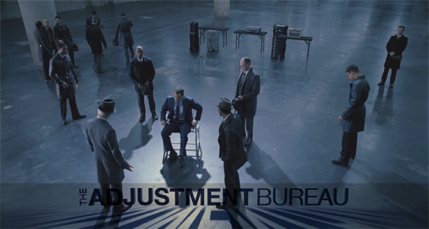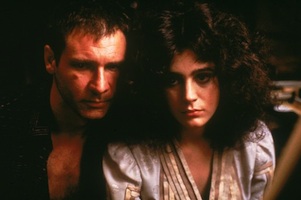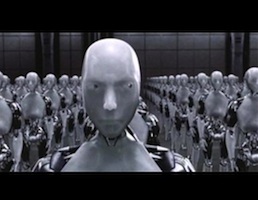There’s plenty for a thinking person to dislike about Hollywood. And if there’s one thing a thinking person should avoid, it’s being petty. One should always rise above the desire to have a knee-jerk snarky reaction to trends. Even when said trends seem to be pandering to a pseudo-intellectual camp of society who think that “dark” and “mind-bending” stories are synonymous with high art. And nowhere is this more annoying than in the pervasive tendency for Hollywood science fiction films to be based on stories or novels by the late great Philip K. Dick.
Now, it would be a capital crime to say as a science fiction reader that I have anything but love and admiration for Philip K. Dick. But for someone who has read other authors in the genre, this trend is getting a little old. Why does Hollywood seem to think he was the only science fiction writer that has ever lived?

With the impending release of yet another Dick adaptation,The Adjustment Bureau, the Washington Post recently published an article on exactly this subject. In it, several SF experts were interviewed and asked to give their opinion on why so many Dick stories are made into films. Perhaps the most telling answer came from famed editor Gordan Van Gelder saying, “Paranoia works great on screen generally, and paranoia runs throughout his work.” This couldn’t be more spot on, but from where this writer sits, this isn’t necessarily a good thing. Almost every single Dick story or novel deals with a protagonist who is alone with the world completely against him or her. When my non-SF reading friends ask me to describe Philip K. Dick I always sum up his oeuvre with one story; “Faith of Our Fathers”, which initially appeared in the first Dangerous Visions anthology edited by Harlan Ellison in 1967. “Faith of Our Fathers” is about a guy who finds out that there are drugs in the water and the only way to see what’s really going on is to take hallucinogenic drugs, which act as an antidote to the proverbial punch everyone’s been drinking. The message of this story is clear: “open your mind, man. The real world is a total lie.”
While this type of storytelling is undeniably entertaining, it does get pretty stale fairly fast. Just how many times can one be shocked by the cliché “YOUR WHOLE WORLD IS A LIE!” premise? Even popular SF movies that are not based on Dick stories suffer from this boring, played-out concept. (You don’t have to be a string theorist to know I’m talking about The Matrix and most Christopher Nolan stuff.) In most Dick-penned stories (like “Paycheck”) the whole story revolves around discovering what the hell is going on in the story. Finding what has happened is what happens. And while this can be great, it is not the totality of what the genre of SF can do. To paraphrase from the satirical Plinkett reviews of the Star Trek films: “you don’t need to cram a stupid mystery plot into everything!” But movie audiences love these kinds of plots, because ultimately these tropes are easy to digest.
 However, while a general critique can be made of all Dick’s premises, the real crime is that any of the complexity of his work is totally lost in these film adaptations. Blade Runner is an obvious exception here, and while it takes a lot of liberties with the source material, the haunting quality of Dick’s work still comes through strongly. (Allegedly, Dick was eventually pleased with Blade Runner) But contrast this with a film like A Scanner Darkly, which visually degenerates into a Scooby-Doo mystery with various people pulling off scatter-suits only to “reveal” they weren’t who you thought they were. When you come to expect these kind of cheap twists, the plot becomes one big yawn. This is the sort of thing hurt the contemporary Battlestar Galactica. Initially the notion that ANYONE could be a Cylon was awesome, but as more Scooby-Doo masks were pulled off, those twists became way less interesting. (Not surprisingly, the producers of BSG mention numerous times in interviews how influenced they were by Philip K. Dick.)
However, while a general critique can be made of all Dick’s premises, the real crime is that any of the complexity of his work is totally lost in these film adaptations. Blade Runner is an obvious exception here, and while it takes a lot of liberties with the source material, the haunting quality of Dick’s work still comes through strongly. (Allegedly, Dick was eventually pleased with Blade Runner) But contrast this with a film like A Scanner Darkly, which visually degenerates into a Scooby-Doo mystery with various people pulling off scatter-suits only to “reveal” they weren’t who you thought they were. When you come to expect these kind of cheap twists, the plot becomes one big yawn. This is the sort of thing hurt the contemporary Battlestar Galactica. Initially the notion that ANYONE could be a Cylon was awesome, but as more Scooby-Doo masks were pulled off, those twists became way less interesting. (Not surprisingly, the producers of BSG mention numerous times in interviews how influenced they were by Philip K. Dick.)
 But what about other science fiction movies based on the work of well-known SF writers? Well, several years ago an absolutely terrible version of I, Robot made it’s way to the screen. I remember a few months prior to this movie being released, I saw Harlan Ellison speak at a community college in the Phoenix metro area. He pleaded with the audience not to go see the film out of respect for Asimov. It’s easy to see why. In it, the robots end up taking over and it ends up being ONE guy against THE SYSTEM. This was never the idea behind Asimov’s work, and certainly not the point of I, Robot. In fact, I, Robot concludes with the world being run by robots, and that’s actually a good thing thank you very much. But Hollywood knows better than to make a movie like that. They know people like their contemporary science fiction movies dark and paranoid. Is this Philip K. Dick’s fault? Of course not. But the elevated status he has in the minds of these Hollywood producers seems to have created a deranged trend.
But what about other science fiction movies based on the work of well-known SF writers? Well, several years ago an absolutely terrible version of I, Robot made it’s way to the screen. I remember a few months prior to this movie being released, I saw Harlan Ellison speak at a community college in the Phoenix metro area. He pleaded with the audience not to go see the film out of respect for Asimov. It’s easy to see why. In it, the robots end up taking over and it ends up being ONE guy against THE SYSTEM. This was never the idea behind Asimov’s work, and certainly not the point of I, Robot. In fact, I, Robot concludes with the world being run by robots, and that’s actually a good thing thank you very much. But Hollywood knows better than to make a movie like that. They know people like their contemporary science fiction movies dark and paranoid. Is this Philip K. Dick’s fault? Of course not. But the elevated status he has in the minds of these Hollywood producers seems to have created a deranged trend.
Not to mention, despite it’s greatness, Hollywood is probably loathe to make a movie version of something like “Faith of Our Fathers” because ultimately the message is that taking drugs will solve your problems. They’ll do dark and pesimistic, but not risky.
So, if these studios ever run out of Dick material, will we then see a film version of The Stars My Destination? What about The Left Hand of Darkness? Or the constant debate: Stranger in a Strange Land? And while all these books I mentioned are quite different from each other, they do have one common thread. You can’t sum up their premise in one sentence and effectively convey the theme. (i.e. The Stars My Destination isn’t JUST about people jaunting.)
For better or for worse, one can usually do that with Philip K. Dick stories. He wasn’t the greatest writer of prose, but he was an idea factory. The drawback here is that his characters were often under-developed and his themes repetitive. This doesn’t always make for the most rounded or thoughtful science fiction movies. (Can anyone count Total Recall among the best and most thoughtful science fiction films? Didn’t think so.)
The irony is that if there were one person who would have objected to a large media organization using the same subliminal messages over and over again to deliver what is essentially a finely-tuned product, that person’s name would be Philip K. Dick.
Ryan Britt’s writing has appeared here, with Clarkesworld Magazine, and elsewhere. His favorite Philip K. Dick book is The Man Who Japed.









